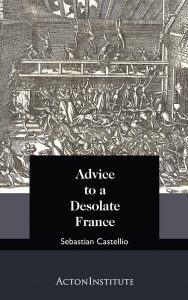


“If any of you has a dispute with another, do you dare to take it before the ungodly for judgment instead of before the Lord’s people?” The Apostle Paul asked the church in Corinth. “Or do you not know that the Lord’s people will judge the world?” Paul continues,
And if you are to judge the world, are you petent to judge trivial cases? Do you not know that we will judge angels? How much more the things of this life! Therefore, if you have disputes about such matters, do you ask for a ruling from those whose way of life is scorned in the church? I say this to shame you. Is it possible that there is nobody among you wise enough to judge a dispute between believers? But instead, one brother takes another to court—and this in front of unbelievers!
Paul’s mandate is clear: matters between Christians should be mediated within the Church. This should be a rather uncontroversial standard, at least for Christians. And yet aren’t we more surprised when Christians attempt to handle legal disputes in this manner?
Since we don’t often respect the value of Christian mediation we should not be surprised to find secular outlets that find the practice unreasonable. Take, for example, the recent New York Times article, “In Religious Arbitration, Scripture Is the Rule of Law.” The authors can barely hide their contempt that some Americans might actually put their religious faith ahead of the legal system:
For generations, religious tribunals have been used in the United States to settle family disputes and spiritual debates. But through arbitration, religion is being used to sort out secular problems like claims of financial fraud and wrongful death.
Customers who buy bamboo floors from Higuera Hardwoods in Washington State must take any dispute before a Christian arbitrator, according to pany’s website. Carolina Cabin Rentals, which rents high-end vacation properties in the Blue Ridge Mountains of North Carolina, tells its customers that disputes may be resolved according to biblical principles. The same goes for contestants in a fishing tournament in Hawaii.
Now you may think it’s preferable to allow contestants in a fishing contest to voluntarily resolve their differences without clogging up the court system. But to the New York Times, this type of application of the First Amendment is scandalous since it allows people to voluntarily forgo their Seventh Amendment right to a civil jury trial.
The Times‘s article is muddled and overly long, but the gist is simple and clear: The writers do not not like the idea that religious principles are ever allowed to decide legal conflicts, even when the people involved have chosen to do so of their own free will. In its typical concern-trolling, the Timesworries that someone, somewhere might actually sign a contract that they didn’t fully read/understand. Or perhaps they did understand what they were agreeing to and simply later changed their mind. They should be able to get out of such voluntary contracts, shouldn’t they?
Well, no, they shouldn’t. One of the fundamental aspects of adulthood is being responsible for your own actions. If you’re not responsible enough to understand a simple contract and stand by your agreement, then you shouldn’t be allowed to engage in contractual agreements in the first place.
Over the years I’ve signed many contracts that include a clause requiring Christian arbitration in cases of disputes. I realize there is always a chance that this could lead to my losing a dispute that I might be able to win if I took it before a secular court. But I sign the agreements anyway. The Bible doesn’t require a particular form of arbitration or mediation, of course. But it does requires I take such matters before fellow believers. Besides, as Paul says,”Why not rather be wronged? Why not rather be cheated? Instead, you yourselves cheat and do wrong, and you do this to your brothers and sisters.”
I don’t really expect the New York Times prehend the notion that sometimes it is better to be wronged than to do wrong to one’s brothers and sisters in Christ. But I do wish more of my fellow Christians acted as if they believed it was true.









